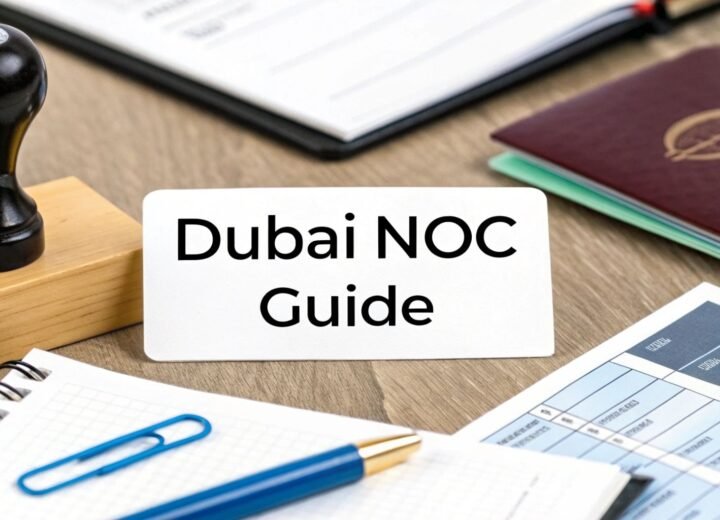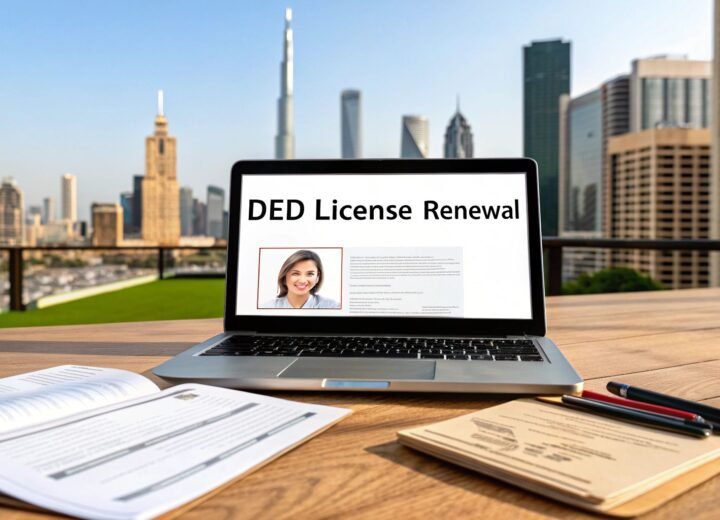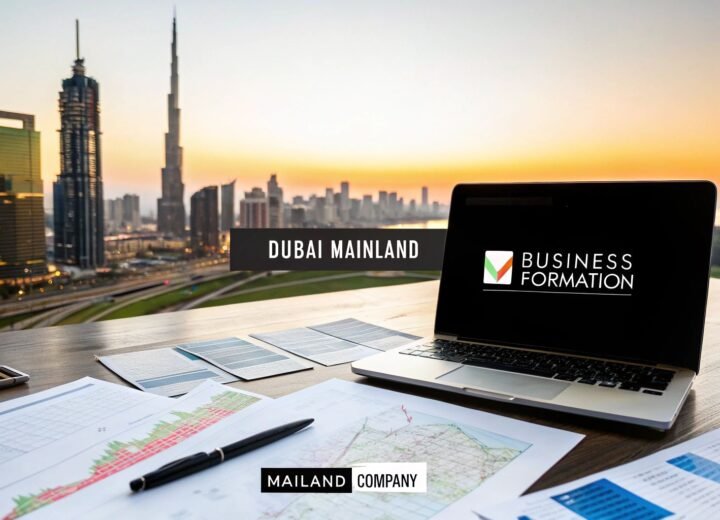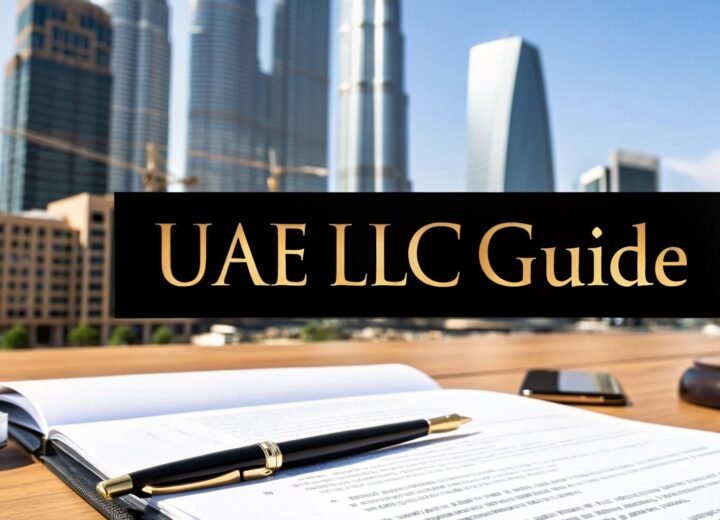Setting up a company on the Dubai Mainland throws the doors wide open to the entire UAE market. You can trade directly with local customers and, crucially, bid on lucrative government contracts.
Not too long ago, this came with a major catch: you needed a local sponsor who held 51% of your company. For many international entrepreneurs, that meant giving up majority control and a significant share of the profits. It was a deal-breaker for some.
But things have changed. Recent legal reforms have completely flipped the script, making 100% foreign ownership a reality for most business activities. This single shift has cemented Dubai's position as a top-tier destination for ambitious founders from around the globe.
Unlocking a New Era for Company Formation in Dubai Mainland
Dubai’s business landscape has gone through a massive transformation. It's moved away from a restrictive model to one that actively encourages foreign investment and gives entrepreneurs the freedom to run their businesses their way.
The old system, with its mandatory Emirati partner, added a layer of complexity and perceived risk. Investors often had to navigate complicated legal agreements just to protect their interests while technically being a minority shareholder. Thankfully, that's all in the past. Today's environment offers a much more direct and secure path to launching your business.

The Game-Changing Shift to 100% Foreign Ownership
The landmark reforms that kicked in back in June 2021 were a real turning point for company formation in Dubai Mainland. These changes did away with the long-standing 51% local sponsor rule for a huge number of commercial and industrial activities.
What does this mean for you? It means you get complete control over your business operations, your strategy, and your finances.
This policy shift has been a powerful catalyst for Dubai's economy. It has massively boosted investor confidence, helping the emirate rank as the second most attractive emerging market for foreign direct investment, according to the 2025 Kearney Foundation FDI Confidence Index.
To see just how much potential this opens up, it's worth exploring why so many see Dubai as a land of opportunities.
Key Advantages of the New Mainland Environment
Getting rid of ownership restrictions brings some serious advantages that give mainland companies a real competitive edge. These benefits go way beyond just ownership—they impact your ability to grow and scale across the entire region.
Here's what you get:
- Total Operational Freedom: You call the shots. All business decisions are yours, without needing sign-off from a local partner. This lets you stay nimble and react quickly to market changes.
- Direct Market Access: A mainland licence means you can trade anywhere in the UAE and internationally with no restrictions. Want to open a shop, an office, or a warehouse? You can do it wherever your business needs to be.
- Eligibility for Government Projects: This is a big one. You can bid on and win profitable government contracts—a market that's largely off-limits to companies based in free zones.
- Unlimited Visa Potential: Mainland companies generally face fewer restrictions on employee visas compared to many free zones. This makes it much easier to build and expand your team as you grow.
The move to 100% foreign ownership isn't just a legal tweak. It's a clear message from the UAE government that it's serious about creating a welcoming and supportive ecosystem for global entrepreneurs.
Before diving in, it's smart to understand the fundamental differences between setting up on the mainland versus in a free zone. Each has its own set of rules and benefits that can significantly impact how you operate.
Dubai Mainland vs Free Zone At a Glance
| Feature | Dubai Mainland | Free Zone |
|---|---|---|
| Ownership | 100% foreign ownership for most activities | 100% foreign ownership |
| Business Scope | Can trade anywhere in the UAE and internationally | Restricted to trading within the free zone and internationally |
| Office Space | Mandatory physical office space required | Can often use flexible desk or virtual office options |
| Government Contracts | Eligible to bid on government projects | Generally not eligible to bid on government projects |
| Visas | Generally no limit on the number of visas (subject to office size) | Visa eligibility is often tied to the size of the office/facility |
| Approvals | Requires approvals from DED and other government bodies | Approvals handled by the specific free zone authority |
Ultimately, the choice between mainland and free zone depends entirely on your business model and long-term goals. For those looking to fully integrate into the local economy, the mainland is often the clear winner. For a wider look at the entire process, check out our complete guide on business setup in the UAE.
Choosing the Right Legal Structure for Your Business
Picking the right legal framework for your company formation in Dubai mainland is one of the first, and most important, decisions you'll make. This isn't just about ticking a box on a form; it's the very foundation of your business. Get it right, and you’ll have the flexibility to grow and the protection you need to operate efficiently across the UAE.
For most entrepreneurs, the go-to option is the Limited Liability Company (LLC). Think of an LLC as a solid wall between your personal assets and your business liabilities. If the company runs into financial trouble, your personal belongings—like your house or car—are generally kept safe. That separation is a massive relief for any business owner.
The LLC structure is also incredibly versatile. It works for almost any commercial activity you can think of, from setting up an e-commerce store and retail shops to general trading and even manufacturing. This adaptability makes it the top choice for anyone looking for broad market access in the UAE.
Understanding Professional Service Licences
But what if your business is all about your expertise, not selling physical products? If you're a consultant, marketer, designer, or another service-based professional, then a Professional Licence is probably the best fit. This structure is specifically for businesses offering professional services, and it comes with a major perk: 100% foreign ownership has long been the norm.
A marketing agency, for example, would go for a Professional Licence, which allows the foreign owners to keep full control of their company. There is one unique requirement, though: you must appoint a Local Service Agent (LSA).
It's really important to understand that an LSA is not a shareholder. They have zero equity in your company and absolutely no say in how you run it. Their job is purely administrative—they act as your representative with government departments for things like visa applications and licence renewals. For this service, the LSA is paid an agreed-upon annual fee.
Other Key Mainland Structures
While LLCs and Professional Licences cover most scenarios, Dubai's mainland offers other setups designed for specific business needs. Each one comes with different rules on ownership and what you're allowed to do.
Let's look at a few other common options:
- Sole Establishment: This is perfect for the solo entrepreneur. It allows one person to own and operate a business. It's simple to set up, but be aware that the business's liabilities are directly linked to the owner.
- Civil Company: This is essentially a partnership for professionals in recognised fields like medicine, law, or engineering. It lets multiple partners combine their expertise under a single licence.
- Branch Office: An excellent choice for established international companies wanting to set up a presence in Dubai. A branch office is simply an extension of the parent company and operates under its name and licence.
Choosing your legal structure is like picking the right vehicle for a journey. An e-commerce brand needs the robust, all-terrain capability of an LLC to trade goods freely, while a solo consultant requires the nimble, efficient ride of a professional license to deliver services.
Real-World Scenarios in Action
To make these concepts clearer, let’s look at two practical examples of company formation in Dubai mainland.
First, imagine a global tech firm wants to open a sales and support office in the UAE. They plan to hire a local team and deal directly with clients here. For them, a Branch Office makes the most sense. It allows them to operate under their well-known global brand while fully integrating into the local market.
Now, think about an entrepreneur launching a high-end jewellery brand with a boutique in a Dubai mall. An LLC is the perfect fit. It gives them the legal structure to import goods, run a retail store, and hire employees, all while protecting the owner’s personal assets from business risks. This setup lets them trade directly with customers anywhere in the UAE without any issues.
At the end of the day, the best structure is the one that lines up with your business model, your long-term goals, and how much risk you're comfortable with. It's a critical decision, so it’s worth taking the time to consider your options and get expert advice to make sure your Dubai venture starts on solid ground.
Your Mainland Company Registration Playbook
Setting up a mainland company in Dubai isn't a maze—it's a structured journey. With the right roadmap, you can get from your initial idea to a fully licensed business without hitting unnecessary roadblocks. The entire process is handled by Dubai's Department of Economy and Tourism (DET), an authority that has put a lot of effort into making the setup process clear for entrepreneurs. This guide will walk you through each critical phase, step by step.
The very first thing you need to do is define your business activities. This decision is crucial because it dictates the kind of licence you’ll need—commercial, professional, or industrial. The DET has a list of over 2,000 activities to choose from, so you'll want to be specific. For example, a "general trading" licence gives you broad scope, but an "IT consultancy" licence is much more targeted. Your choice here will influence everything from your legal structure to whether you need any external approvals.
Securing Your Business Identity and Legal Foundation
Once you've settled on your activities, it's time to secure your trade name. This is more than just branding; it's a formal reservation with the DET. The name has to be unique, can't go against public morals, and must avoid any religious or government-related terms unless you have special permission. Think of it as your company's first formal introduction.
With your name approved, the next step is drafting the Memorandum of Association (MOA). If you're setting up a Limited Liability Company (LLC), this document is the absolute legal backbone of your operation. It details the company's objectives, who owns what shares, how profits and losses are split, and the duties of each partner. It's a legally binding contract, so getting every detail right from the start is vital. The MOA must then be notarised by a public notary in the UAE to make it official.
A well-drafted MOA is your best protection against future disputes. Think of it as the constitution for your company; it sets the rules of engagement for all partners and provides a clear framework for decision-making and resolving disagreements.
This infographic gives you a quick visual breakdown of the most common legal structures you might consider.
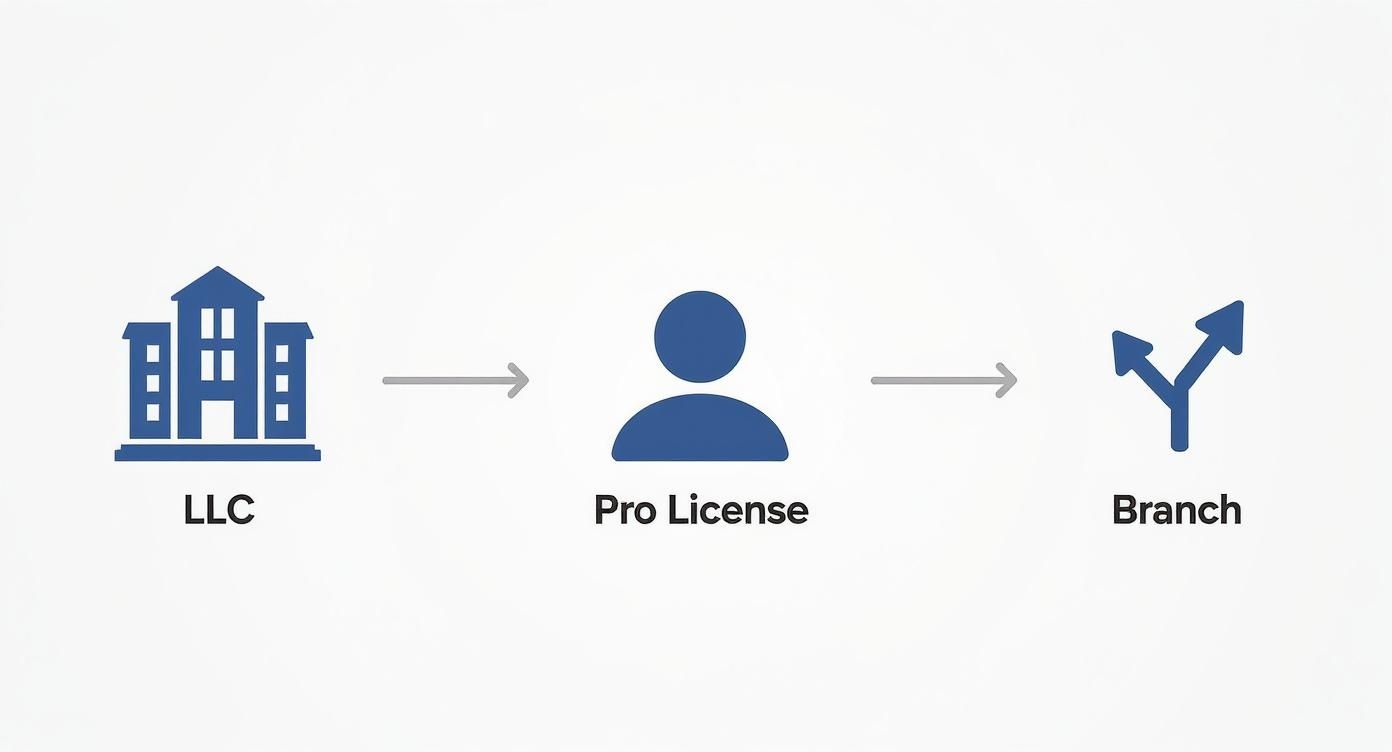
As you can see, an LLC is a popular choice for commercial businesses, while a professional licence is designed for service providers. A branch office structure, on the other hand, is a great fit for established international companies looking to expand.
Establishing Your Physical Presence
One non-negotiable for any mainland company is a physical office. Virtual offices or a desk in a co-working space won't cut it. You must lease a commercial property and get the tenancy contract registered through the Ejari system, which is managed by the Real Estate Regulatory Agency (RERA).
The Ejari certificate is a mandatory document for your licence application. It proves you have a legitimate business address, which will be used for all official mail and inspections. Keep in mind, the size of your office can also affect how many employee visas you’re eligible for, so it's a strategic decision that can impact your future growth. Finding an affordable office that ticks all the regulatory boxes is often one of the first major hurdles for new businesses.
Final Submission and Receiving Your Licence
Okay, so you've reserved your trade name, notarised your MOA, and secured your Ejari. Now you have all the core pieces for your final application to the DET. This is usually done online or at an approved service centre. The DET will review everything to make sure it aligns with the legal requirements for a mainland company.
If your business activity needs a thumbs-up from other government bodies—like the Dubai Health Authority for a clinic or the Knowledge and Human Development Authority for a school—you need to get those approvals before your licence can be issued. This can add extra time to the process, so it's smart to figure out what you need and get started on it early.
Once all your documents are verified and any external approvals are sorted, the DET will issue a payment voucher for the licence fees. After you've paid, you’ll receive your official trade licence. This is the document that legally authorises your company to operate in Dubai. To get a better handle on this key document, you can learn more about the trade license in Dubai and why it's so important.
Holding that trade licence for the first time is a huge moment. It's the point where your business goes from a plan to a reality. With your licence in hand, you can move on to the final steps: getting your company’s Establishment Card, opening a corporate bank account, and starting the visa process for yourself and your team.
Breaking Down the Costs and Timelines
When you're planning to set up a mainland company in Dubai, two of the biggest questions are always: "How much will it cost?" and "How long will it take?" Let's be clear—there’s no single, one-size-fits-all answer. The final figures depend heavily on what your business does and how well you prepare.
Think of the total cost not as one big fee, but as a collection of different payments. You'll have fixed government fees, essential third-party charges, and your own operational costs. Getting a handle on these moving parts is the first step to a smooth and predictable launch.
Core Government and Third-Party Fees
Your financial journey kicks off with a few non-negotiable government fees paid to the Department of Economy and Tourism (DET) and other authorities. These are the foundations of your setup budget.
You'll start by reserving your trade name—a small but vital first step. Next comes the Initial Approval, which is basically the government giving you a preliminary nod to proceed. The most significant government cost is usually the trade licence fee itself, which makes your business official.
But that's just the government side of things. You also need to budget for several other crucial expenses:
- Memorandum of Association (MOA) Notarisation: This legal document outlining your company structure must be professionally drafted and stamped by a public notary.
- Office Rent and Ejari: A physical office space is mandatory for mainland companies. This means paying annual rent and a separate fee to register your tenancy contract on the Ejari system.
- PRO Service Fees: While you can do it yourself, most entrepreneurs hire a corporate services firm to manage the paperwork and deal with government departments. Their professional fees can save you a world of time and prevent mistakes that could cost you more in the long run.
- Establishment Card: This card is your company's registration with the immigration authorities, and you can't apply for any employee or investor visas without it.
My best advice is to look past the headline trade licence fee. To build a realistic budget from day one, you have to factor in everything: rent, notarisation, visa processing, and professional service fees.
To give you a practical example, a small tech consultancy will have a very different cost structure from a general trading company. The consultancy might get by with a small, shared office space, keeping initial costs down, while the trading company will likely need a larger warehouse or storefront, driving up its initial investment.
Estimated Cost Breakdown for a Mainland LLC
The table below gives you a ballpark idea of the costs involved. Remember, these are just estimates. The actual amounts can change based on your business activity, the location you choose for your office, and how many visas you need.
| Cost Component | Estimated One-Time Fee (AED) | Estimated Annual Fee (AED) |
|---|---|---|
| Trade Name Reservation | 600 – 800 | – |
| Initial Approval | 150 – 250 | – |
| MOA Notarisation | 1,500 – 3,000 | – |
| Trade Licence Issuance | 10,000 – 15,000 | 10,000 – 15,000 |
| Office Rent (Ejari) | Varies | Varies |
| Establishment Card | 2,000 – 2,500 | 2,000 – 2,500 |
| PRO Services | 3,000 – 6,000 | Varies |
As you can see, some costs are a one-off, while others, like the trade licence and establishment card, are recurring annual expenses you'll need to plan for.
Setting Realistic Timelines for Your Setup
Just like the costs, the time it takes to get your company up and running can vary quite a bit.
For a straightforward professional services business—say, a marketing consultancy—that doesn't need any special external approvals, the entire company formation in Dubai mainland can be wrapped up in as little as one to two weeks. The process is efficient because the paperwork is standard.
However, if your business is in a regulated field, you need to be more patient. A healthcare clinic, for instance, requires approvals from the Dubai Health Authority (DHA), which can easily add several weeks to the timeline. Similarly, setting up a training centre means getting a green light from the Knowledge and Human Development Authority (KHDA). For these kinds of specialised businesses, a more realistic timeframe is four to eight weeks.
The secret to a fast setup? Preparation. Most delays aren't caused by bureaucratic red tape, but by simple things like incomplete or incorrect paperwork. Having all your documents in order—passport copies, visa stamps, a solid business plan—before you start can make a huge difference. This is where working with a good setup consultant pays off; they know exactly what's needed and can help you navigate the process without any unnecessary hold-ups.
Life After Your Licence: Visas, Banking, and Getting Operational
Getting that trade licence in your hands is a huge milestone, but it's really just the starting whistle. Now, the real work begins to turn your on-paper company into a fully functioning business. Your immediate priorities? Securing residency visas and opening your corporate bank account. Getting these two things right is crucial for a smooth start.
Before you can even think about visas, your first task is to get your company's Establishment Card. This is the document that officially registers your business with the immigration authorities, and you absolutely cannot sponsor anyone without it. Think of it as opening your company's immigration file.
Once that card is active, you can kick off the process for your own investor or partner visa. After that's sorted, you can move on to sponsoring your employees and, in most cases, your family.
Navigating the UAE Visa Process
The visa journey is a step-by-step process where the order of operations really matters. While our PRO services team handles the nitty-gritty, it’s always good for business owners to know the roadmap.
Here’s what the typical sequence looks like once your application is in the system:
- Entry Permit Issuance: First, you get an electronic permit. This document lets you legally stay in the UAE while the rest of your residency visa is processed.
- Medical Fitness Test: Next up is a trip to a government-approved health centre. Every applicant needs to complete this medical screening, which checks for specific communicable diseases.
- Emirates ID Biometrics: You'll then visit an Emirates ID service centre to provide your fingerprints and have a photo taken. This is a vital step for getting your official national ID card.
- Visa Stamping: With a clear medical test and completed biometrics, your passport is sent to immigration for the final step: stamping the residence visa directly into its pages.
This same multi-step process applies whether you're an investor or sponsoring an employee. Getting through these stages efficiently means your team can legally live and work in the UAE without any frustrating delays.
Getting your company operational after the licence is issued is all about momentum. A quick visa process lets you bring talent on board, and a working bank account lets you start transacting. You need both to hit the ground running.
The Challenge of Opening a Corporate Bank Account
While getting a visa is a fairly structured, predictable process, opening a corporate bank account in Dubai can be a different story. UAE banks are incredibly diligent, following strict international compliance and Know Your Customer (KYC) regulations. This means they do a deep dive into every new business account application.
The bank needs to feel confident in your business model, understand where your funds are coming from, and know what kind of transactions you'll be making. Your job is to make it easy for them by preparing a rock-solid file of documents.
You'll typically need to provide:
- Your complete trade licence and all company registration papers.
- The signed Memorandum of Association (MOA).
- Passport copies, visa pages, and Emirates IDs for every shareholder.
- A detailed company profile and a solid business plan.
- Proof of your office address (your Ejari).
A well-organised and comprehensive application can genuinely speed things up. If you want to dive deeper, check out our guide on how to open a business bank account in Dubai.
As you get ready to operate, another simple but important step is creating a professional email address. It might seem small, but it adds a layer of credibility that both banks and potential clients will notice.
This thorough vetting by banks is what protects the integrity of the UAE's financial system. Right now, business confidence in Dubai is high, with the Business Confidence Index (BCI) sitting at 114.3 points in Q1 2025. This optimism means companies are growing, and with 70% of UAE SMEs looking for credit to expand, a functioning bank account is your gateway to that growth.
Got questions about setting up a mainland company in Dubai? You're not alone. When you get into the nitty-gritty of the process, a lot of specific questions pop up. Let’s clear up some of the most common ones so you can move ahead with confidence.
Do I Still Need a Local UAE National for My Mainland Company?
For most businesses, the simple answer is no. Thanks to some major legal updates, 100% foreign ownership is now the standard for the vast majority of mainland companies. That old rule about needing an Emirati sponsor to hold a 51% share is a thing of the past for most activities.
But there's a small catch for certain business types. If you're setting up a company with a professional service licence—think consultancies or similar service-based businesses—you'll need to appoint a Local Service Agent (LSA).
It's really important to know that an LSA is not a shareholder. They have zero shares and absolutely no say in how you run your business. Their role is purely administrative; they act as your official go-between for government paperwork and get paid an annual fee for it.
Is a Physical Office Mandatory for a Dubai Mainland Licence?
Yes, this one is non-negotiable. Every mainland trade licence must be tied to a physical office space in Dubai. You have to show a valid tenancy contract that's been registered with the Real Estate Regulatory Agency (RERA), which is known as an Ejari.
Don't think you can get by with a virtual office or a simple co-working desk space. The authorities require a proper commercial property lease to serve as your official business address. It’s a core requirement for getting your licence issued and for every renewal down the line.
What Are the Main Tax Benefits of a UAE Mainland Company?
The UAE's tax system is one of its biggest draws for entrepreneurs and businesses from around the world. It’s incredibly straightforward and business-friendly.
Here are the key advantages:
- No Personal Income Tax: Whatever you earn personally is all yours to keep.
- No Capital Gains or Withholding Tax: This really encourages you to invest in your business and keep profits circulating.
- A Very Competitive Corporate Tax: The federal Corporate Tax is set at 9%, but—and this is a big but—it only kicks in for taxable profits that go over AED 375,000. For many startups and small businesses, this means they effectively pay 0% tax.
On top of all that, the UAE has a huge network of double taxation avoidance treaties, which is a massive plus if you're planning to operate internationally.
The UAE’s tax structure is deliberately built to fuel growth and attract top global talent. That high profit threshold before Corporate Tax applies makes it one of the most competitive places in the world to launch and grow a business.
Can I Get a UAE Residence Visa with My Mainland Company?
Absolutely. This is one of the best perks of setting up on the mainland. As the owner or a partner in a Dubai mainland company, you are fully eligible to apply for a UAE investor visa, which gives you long-term residency.
Once your own visa is in place, your company can then start sponsoring residence visas for your employees. You can also sponsor your immediate family members, making it a complete package for anyone looking to relocate, live, and work in the UAE.
Ready to get your company formation in Dubai mainland sorted with zero stress? At PRO Deskk, we make every step simple. As specialists, we provide:
- ✅ Mainland Company Formation in Dubai, Sharjah & Abu Dhabi
- ✅ Freezone Company Formation across the UAE
- ✅ Golden Visa on Property and Investor Visa services
- ✅ Corporate PRO Services and Attestation Services
- ✅ Cost-Effective Business Setup Solutions tailored to your needs
- ✅ Guidance to help you enjoy UAE Tax Benefits for International Entrepreneurs
- ✅ 24/7 Support Service – We're always here when you need us
📞 Call Us Now: +971-54-4710034 or WhatsApp Us Today for a Free Consultation.

